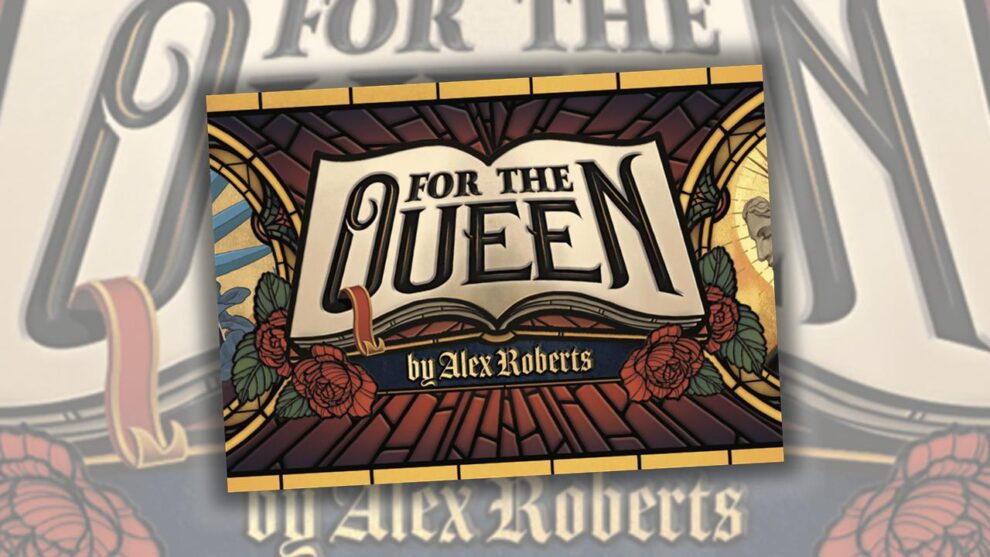Disclosure: Meeple Mountain received a free copy of this product in exchange for an honest, unbiased review. This review is not intended to be an endorsement.
‘The Queen is under attack. Do you defend her?’
Despite having written stories and played tabletop games all my life, I’d never played a role-playing game (RPG) before For the Queen.
The main reason for this is that none of my friends play them. Of course, I could have found groups elsewhere, but shyness, insecurity and laziness are among my many flaws. Many RPGs also involve investing in long campaigns and require a Games Master (GM) and/or a reliable group of more than 2 players.
So yeah, I write stories, tell tales, create characters and plot plots all the time, but the various personal and genre barriers mean I’ve never played an RPG. I’ve always been curious though.
Enter For the Queen, designed by Alex Roberts (II) and published in its second edition by Darrington Press. A one-shot, 1-2 hour, GM-less RPG that works with 2 to 6 players and has a broad enough setup that pretty much anyone can understand. I remember reading about it when the first edition was released back in 2019 and seeing several players recommending it for those new to RPGs. When the second edition was released, I jumped at the chance to try it.
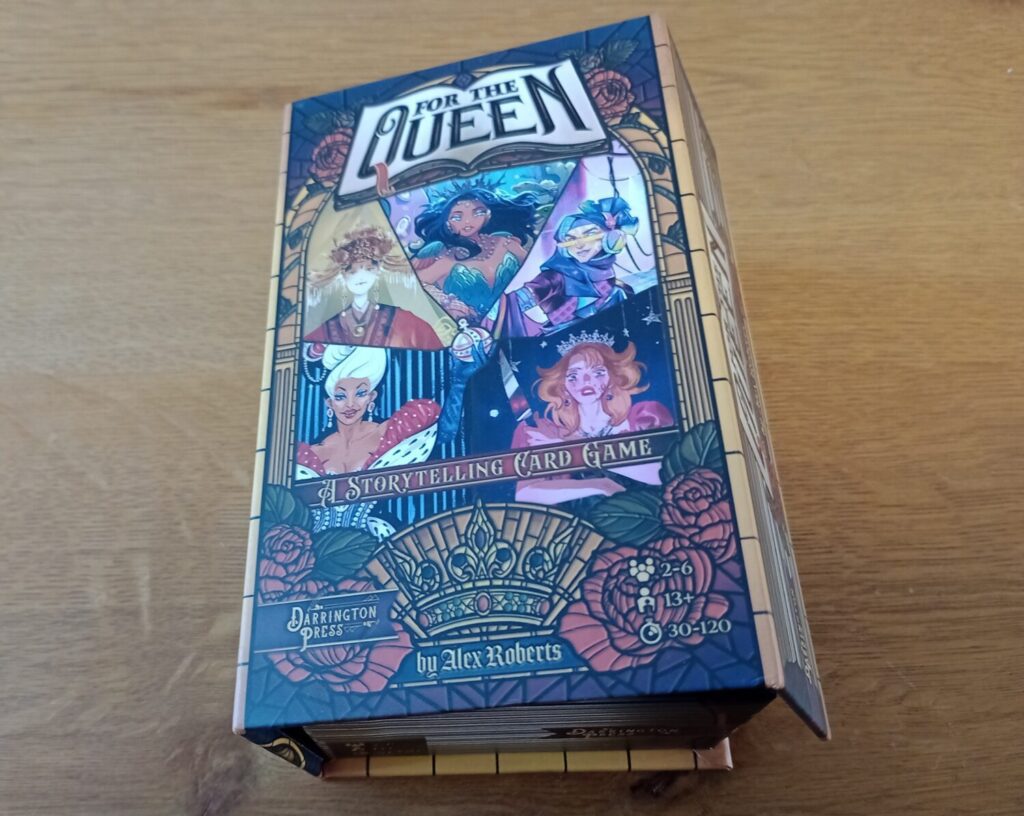
Sometimes, however, what people write online is best understood with some background. The context around a statement can be just as important as the statement itself. The problem with all those articles that suggested For the Queen was great for novices is that they were all written by people already well experienced with RPGs.
I absolutely cannot recommend For the Queen as a ‘My First RPG’ experience, at least not for a group in which all players are new to RPGs. Perhaps for introducing one or two new people in an already experienced group, but it’s not a game I’d suggest to any group looking to completely start from scratch.
That said, I absolutely do recommend For the Queen to anyone with some experience of RPGs.
Dipping my toes in
Here’s the premise: You, the players, are part of your Queen’s retinue on your way to a distant power to broker an alliance. You love your Queen, this is made very clear from the start, one of the only things that is.
Over the course of the game, players take turns flipping over cards and answering the questions written on them. Other players can ask you about your responses or ask follow-up questions, and you can opt to not answer a question and instead turn over a new card. The game continues like this until the ‘The Queen is under attack’ card is revealed, at which point each player answers whether or not they would defend the Queen and the game ends.

For a complete RPG novice like myself, For the Queen is incredibly easy to start playing. Sort the cards, read the instruction cards out loud, select a Queen for the game from a selection of gorgeous illustrations, seed the question deck with the ‘Queen is under attack’ card and select someone to go first. You could be up and playing a few brief minutes after getting your hands on a copy. From a purely practical standpoint it’s ideal for the newbie, the only barriers being finding one or more people to play with and setting aside 30 to 120 minutes to play. Easy.
Keeping my head above water
As for the actual playing, For the Queen plunges you in at the deep end. You start the game knowing nothing other than what I’ve written above – you’re part of the Queen’s retinue, you all love her and you’re all on a journey to make an alliance. That’s about it.
Who are you? Who is everybody else? How do you know each other? What are you actually doing? Why are you doing it? Who is the Queen as a person, and what is your history with her? How and why do you love her?
They’re questions you’ll get to as the game goes on, but at the start the slate is completely blank. There’s almost nothing to direct you, nothing to help remind you that you’re playing as characters and not yourselves.
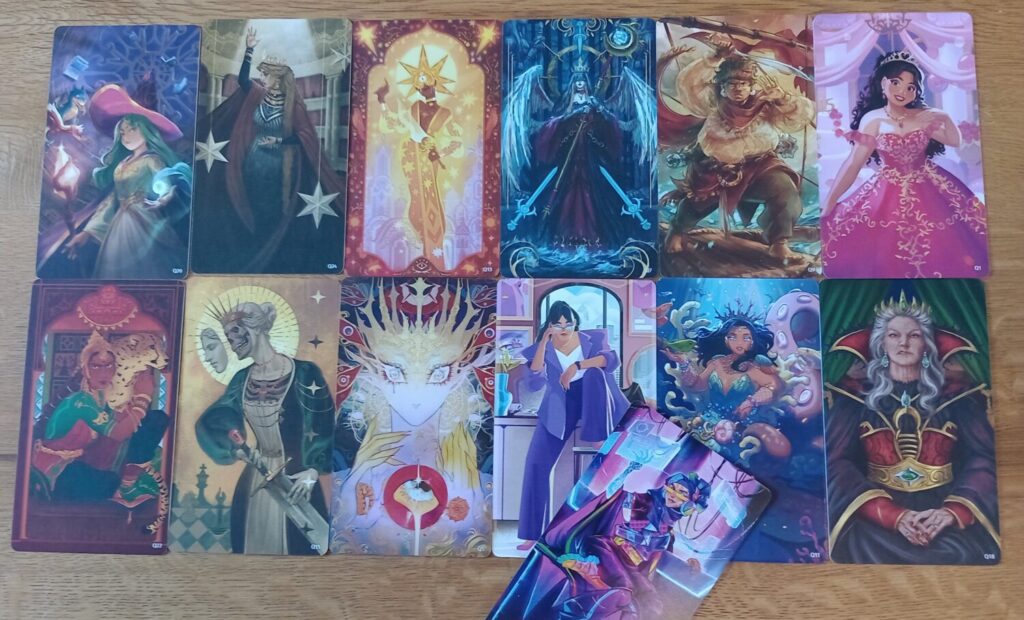
There’s also a complete lack of purpose or direction; you aren’t trying to achieve or do anything and there isn’t a specific endpoint or goal. There’s no way to win or succeed. That isn’t a bad thing. I don’t need a goal, and I like the idea of improvising our characters, but starting off with nothing, for people new to RPGs, isn’t easy. As I said, it’s the deep end of role-playing, especially given the questions themselves.
They’re thought-provoking, of course, but many are also intimate and personal. This is a game about relationships, about shared histories, about a Queen that may or may not deserve your love, about the webs of trust and deceit that stretch between you. One of the questions says, “Other than the Queen, there is someone else in this retinue that you love. Why are you keeping it a secret?” It’s a question that suggests you consider who you love in the retinue, what your relationship with them is and then asks you to talk about why you can’t tell anyone else. That’s multiple steps of thought before you get to the answer. You could just skip to that last point but not considering the proceeding steps doesn’t feel in keeping with the game, even if you only discuss the reasons why it’s a secret and keep the rest to yourself. Reveal that question in the first couple of turns, when you don’t know who you or the other players are – that’s challenging to improvise for people who haven’t cut their tale-telling teeth on other RPGs.
There’s a reason there’s a card you can touch to skip a question. The questions can make some people feel uncomfortable or embarrassed. In an interview with Polygon, Roberts talked about the “intense power dynamic” in the game and that some people “get horny about that”. Whilst you only get what you bring to the game and nothing in the questions is at all sexual, some newer players might struggle with the undertones that they read between the question lines.
Other questions feel more suited to larger groups. “What makes you want to abandon the retinue, and who, besides the Queen, makes you stay?” reads one question. And sure, there’s nothing in the game that says there aren’t other non-player characters who you can point to, but it’s a lot more interesting if you’ve a few actual players to choose from and non-player characters.
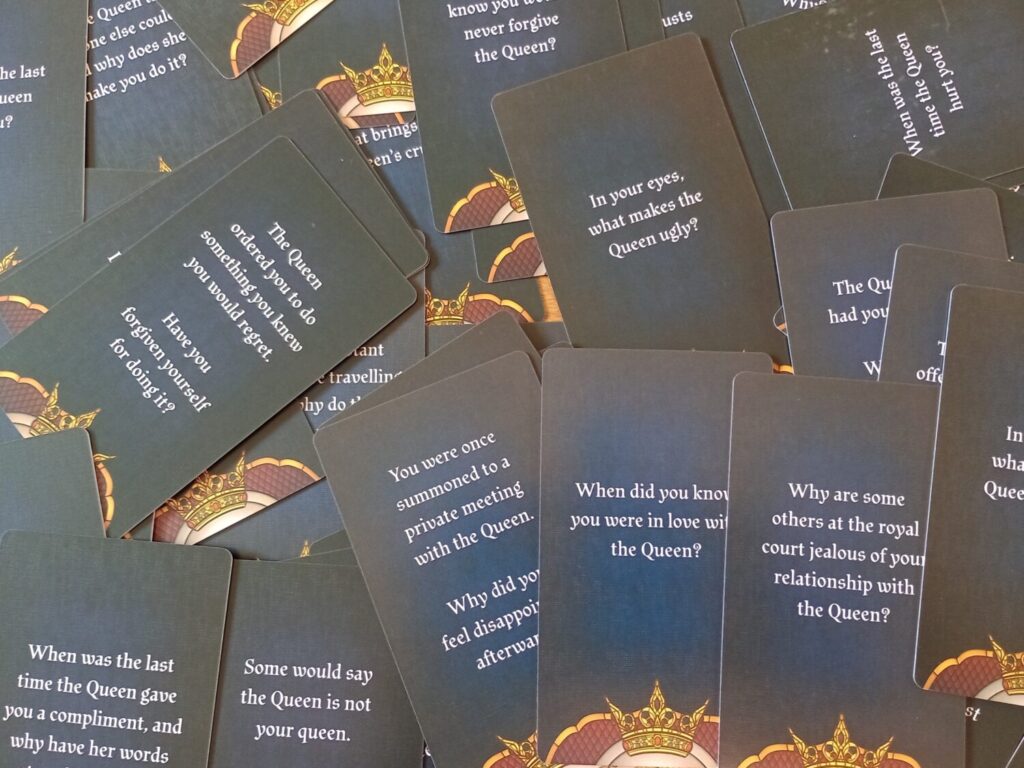
My first game was with two other RPG-newbies. With no idea of who we were and nothing to aim for, it was a challenging introduction to improvised storytelling. Dungeons & Dragons this isn’t. We hadn’t created characters with goals, interests or strengths, and we weren’t venturing out to defeat bad guys or find treasure. Instead, we were pulling who we were and our various intertwined relationships out of the air like amnesiacs trying to avoid being caught without our memories.
The three of us have been good friends for over 20 years, and for a few of those years we wrote music together in a band. In other words, we’re used to being creative together and making fools of ourselves in front of each other. Even so, it wasn’t a great success. It wasn’t a bad experience, there were some funny and interesting moments, but that lack of handrails made for some unnerving turns as we floundered around for something to hold on to narratively. Suddenly all that prep that other RPGs put in with character creation seemed worth the extra time and effort.
I’m trying to convey that the reasons I wanted to play For the Queen were wrong. It’s easy to try – no GM, low player count range, quick to start, mechanically as simple as they come – but as a complete RPG-novice it’s not that easy to actually play or even enjoy.
But…
Learning to swim
For those looking to explore what RPGs have to offer beyond quests and upgrades, for those looking for a new and interesting experience, For the Queen is excellent.
About a third of the way into the game something magical happens. Yes, everything is unknown at the start, the flashing cursor on a blank page. And you may well be daunted by that. But that cursor moves as you play and words fill the page, unexpected and intriguing. Backstory and characters and plot points and story beats. The retinue and the Queen rapidly become complex and three-dimensional individuals. It’s the character creation and the story itself rolled into one.
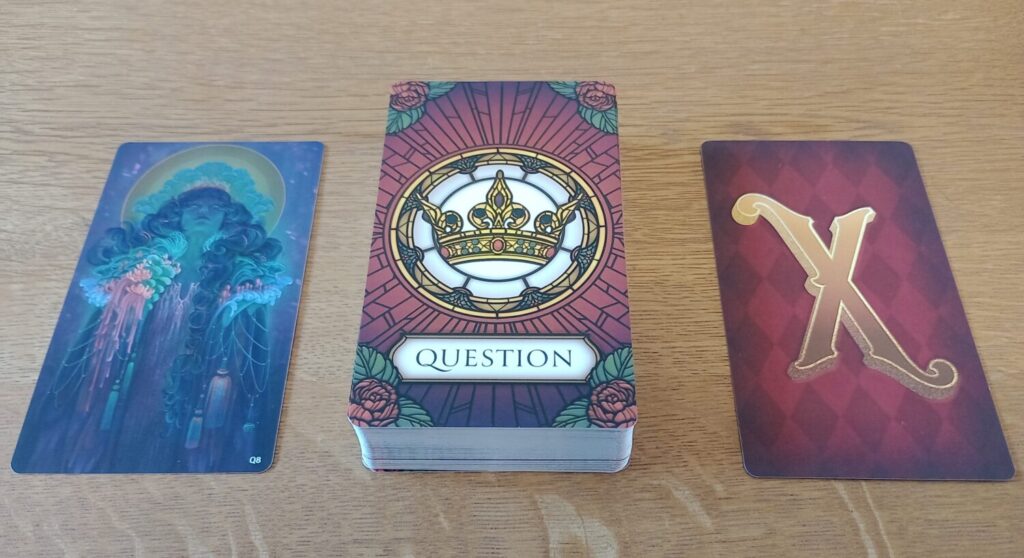
As you listen and speak, who you are playing solidifies in your mind and the links between the players become clearer. By its very nature, For the Queen creates interesting characters, intrigue and shared history. It creates a spectrum of relationships; it illuminates the good and the bad and everything in between.
And this happens whether you want it to or not. One person I played with tried to break the game, answering questions to be funny, their responses filled with innuendos (and if you’re of that mindset then some of the questions are easy to twist, as Roberts acknowledged in that interview). And their responses were funny, no doubt about that. Immature perhaps, but genuinely and inventively funny. Yet the weight of the narrative being woven about them meant that even their jokes became something more than stupid humour. What seemed like a flat stereotype gained a second dimension and then a third. Still amusing and still more likely to talk about their sexual exploits than anyone else, but human in their imperfections, almost tragic in their backstory and aspirations.
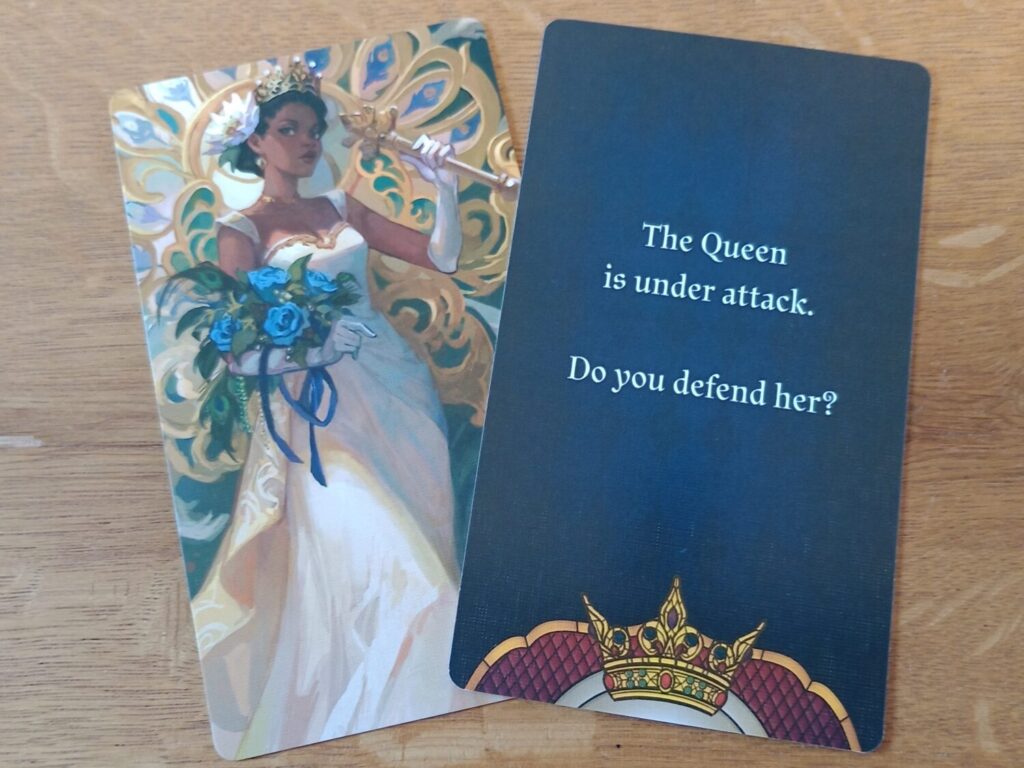
For the Queen takes place in a single moment in time. The attack is the sole piece of activity in the game; temporally-speaking it’s the whole game itself. All those questions simply provide the context that frames this one moment. You could have spent an hour and a half in the millisecond before the Queen was attacked. Everything is to provide context and background for this one moment and your decision. Often, the longer the game, the richer the moment (shorter games are fine, but 30 minutes as on the box feels a little too short for me). Everything you say and hear builds that understanding of the attack and the choices the players make.
It’s fascinating. It can also feel a little anticlimactic.
Whilst you can discuss what would happen next and the reasoning behind your decisions, the fact that the game ends on this key moment means there’s no denouement or resolution. You invest all this time in these characters and then the plug is pulled and the cursor blinks for the last time. It feels narratively jarring. You’ve built this world and fleshed out this dramatic moment, and then what? Perhaps this is a hangup from that lack of purpose or goal? After all, it’s about the journey, not the destination, and the game is purposefully placed in the storytelling experience, in the characters and relationships. The plot is secondary.
The game’s structural reliance on question prompts also makes it harder to come up with a satisfying conclusion for yourself. I wish there were some follow up question prompt cards for after the attack. I’ve got questions I can ask players to stimulate discussion at the end if needed, but it feels like there’s a missed opportunity to ask probing and thoughtful follow-up questions, even just once round the table.
This minor weirdness aside, For the Queen is a remarkable achievement.
Even I, still an RPG novice but no longer a complete noob, can see that. The presentation from Darrington Press is sumptuous, the production is clean and elegant. Roberts’ question prompts manage to say a lot with a little, setting the tone and providing just enough friction to create drama and intrigue. There’s so much scope to be creative, so much freedom to explore. Roberts published For the Queen under a Creative Commons license, and you can find dozens of RPGs inspired by the design under the Descended From the Queen label. It’s inspiring for those looking to explore this space further.
I don’t think For the Queen should be your first RPG, but I absolutely recommend it to anyone who wants to spend an evening focusing on characters and relationships rather than simply questing through dungeons.


